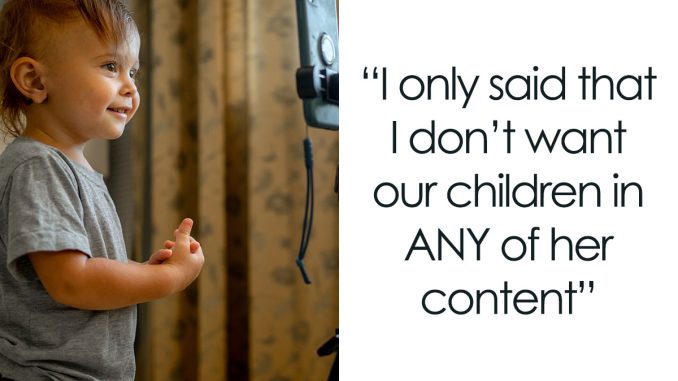
Being a social media star is very appealing and the reasons why many adults want to be influencers are plenty. From the outside, the influencer life seems luxurious, with all the expensive brand deals and gifts they receive. It also doesn’t seem too difficult of a job—just filming and taking pictures of yourself. Influencers also seem to have a very flexible schedule and go on nice vacations, which is a great bonus.
However, the price one pays for “being famous for being famous” is, in fact, quite big—privacy. Many influencers often post what they do in their lives, what their routines are like, and talk about things that happen to them. They have to do it day in and day out to maintain their presence online. This requires giving up a lot of the intimate day-to-day details of your life.
The conversation becomes especially tricky when talking about family influencers. Parents that use kids in their content are often looked at with suspicion. As laws protecting kids that participate in their parents’ content are only rolling out right now, many fear for the children’s wellbeing. It seems unfair to plaster the internet with images of your child who doesn’t fully grasp what the internet is and not pay them for their “job.”
The man in the following story understood how tricky family content can be, so when his partner decided to become an influencer, he raised his concerns. They both agreed on the terms and she proceeded with following her dream. Read on to see how it all went wrong and what social worker Maddie Spear (TikTok, Instagram) had to say about publishing child content online.
When it comes to putting content with children online, parents need to be on the same page
Image source: nastuffa (not the actual photo)
The dad in the following story thought that he and his wife had agreed on what’s acceptable and what’s not. That’s until he watched one of her videos
Image source: Timur Weber (not the actual photo)
Image source: throwrasutwy
The husband is right to be concerned, but there might be a way to compromise
Image credits: ShotPot (not the actual photo)
When talking to Maddie Spear, Master of Social Work and licensed clinical social worker, about posting children content online, she emphasizes a few ethical considerations. The most important one being that young children cannot fully grasp what the internet is, its permanence, and the consequences of posting online. That is why they are not able to give anyone informed consent about being online.
She also points out that not all people on the internet have the best intentions. “It is absolutely not all doom and gloom, but it’s important for parents to ask themselves if putting their children online is really worth risking the safety and well-being of their family.”
Another important part of considering whether or not to publish children content online is considering how that content will age. “Remember the home videos that your parents took of you as children? How would you feel 20 years later if you knew 100,000 people saw them? Would you be grateful to your parents that the world got to see your cute and funny humor? Or is there any chance at all you would feel this is an invasion of privacy and maybe even embarrassing?”
Family channels have a track record of being awful
Image credits: Thgusstavo Santana (not the actual photo)
According to Spear, being part of a family channel can be detrimental to a child’s wellbeing. “When children are constantly taught that they are needing to perform to be good enough for their family’s channel, it creates this intense pressure to please others and seek out attention in the future. Although this alone is not a bad thing, it can lead to poor self-esteem, people pleasing behaviors, and poor attachment to the ones they are in a relationship with.”
In recent years, there have been many instances of very problematic family channels. There was the mother that urged her child to cry when he was vulnerable, and the one that rehomed her adopted child after he became too difficult. Both these influencers quit their careers after.
8 Passengers is another family YouTube channel that invited a lot of scandal due to the behavior of the mother, Ruby Franke. At various points through her influencer career, she admitted that she took away her son’s bedroom for 7 months and did not bring lunch for her 6-year-old because she needed to learn “responsibility.” The channel is now defunct and the mother was recently arrested and charged with 6 counts of child abuse.
There might be a way to have a family channel that is not exploitative
Image credits: Jesus Loves Austin (not the actual photo)
While many family channels are problematic, there might be ways of creating ethical family content. That type of content should mainly focus on the parents, not the children. If the children are present in the content, they should only be portrayed in a positive light. Their time in the content should be limited, and they should only be on there if they want to.
“At the end of the day,” Spear concludes, “the children’s safety and enjoyment are the utmost priority of the family.” She suggests that regarding the husband and wife’s story, they should dig deeper into why they hold these beliefs. Why does the mom want to be an influencer? Why is the dad so against it? “A realignment of values would be very helpful in the situation.”
All in all, navigating the influencer space can be tricky, but children’s needs should be put first. It’s obvious that the couple will have to come to some sort of compromise to carry on.
Many commentators agreed that he is right in this situation
The post Woman Bursts Into Tears After Husband Demands She Delete All Her Mommy Influencer Content first appeared on Bored Panda.
